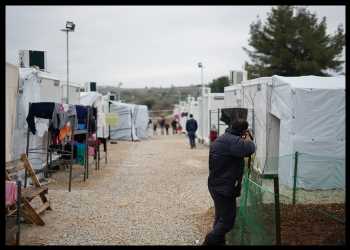Sweeping Measures To "Humanely Manage' Immigrants At US Border Announced
As part of the comprehensive, multi-agency, multi-country plan to prepare for the return to processing migrants under Title 8 authorities, the Departments of State and Homeland Security have announced a set of sweeping measures to humanely manage the influx of immigrants at U.S. borders through deterrence, enforcement and diplomacy.
With the support of the Department of Defense and multiple countries across the Western Hemisphere, DHS and State are implementing that plan within the constraints of a broken immigration system, the State Department said in a statement.
When the pandemic-era Title 42 public health order lifts on Thursday with the easing of Covid-19 pandemic, the United States will be strengthening its enforcement of long-standing Title 8 immigration authorities to expeditiously process and remove individuals who arrive at the U.S. border unlawfully and do not have a legal basis to remain.
Individuals who cross into the United States at the southwest border without authorization or without having used a lawful pathway, and without having scheduled a time to arrive at a port of entry, will be presumed ineligible for asylum, absent an applicable exception. If removed, they will be barred from re-entry for at least five years and subject to potential criminal prosecution for repeated attempts to enter unlawfully.
The State Department plans to eventually open about 100 regional processing centers at key locations in the Western Hemisphere, and in the coming days will launch an online platform for individuals to make appointments to arrive at a center near them. Over 140 Federal personnel, including from DHS and State, and personnel from the International Organization on Migration and the United Nations High Commissioner for Refugees are being deployed to support these brick-and-mortar centers, which will serve to direct migrants to lawful pathways early in their journey and well before reaching the southwest border. Personnel at Regional Processing Centers will screen individuals for eligibility for U.S. refugee resettlement or other lawful pathways to the United States, Canada, and Spain.
The initial 550 U.S. military personnel will be in place Wednesday, starting in El Paso, to begin supporting U.S. Customs and Border Protection (CBP) at the southwest border. They will join the 2,500 National Guard troops already supporting CBP at the border. These additional troops will provide administrative support at CBP facilities, including data entry, warehousing assistance, and augmenting CBP surveillance and detection activities so that CBP agents and officers can get out in the field to secure and humanely manage the border. The remaining 1,000 troops will be announced soon and will include Army, Marine Corps, and Air Force personnel, according to the State Department.
To humanely manage increased encounters, CBP and U.S. Immigration and Customs Enforcement (ICE) are further expanding detention capacity, ramping up removal flights, and shifting agents and officers to high-priority regions along the southwest border. This week CBP opened two new holding facilities, and the Department of Health and Human Services (HHS) is increasing its bed capacity to prepare for a potential increase in unaccompanied children. DHS also launched targeted enforcement operations in high-priority regions along the border, including El Paso, to quickly process migrants and place them in removal proceedings.
DHS will transition the CBP One App to a new appointment scheduling system to enable improved access to this process for seeking asylum into the United States.
The Biden administration is implementing new reforms at a time when Congress refuses to reform broken immigration laws or provide the necessary funds to hire sufficient asylum officers and immigration judges to process claims.
Smugglers have stepped up their efforts to falsely claim the border is open in order to profit off vulnerable migrants from countries like Mexico, Panama, Colombia, Venezuela, Nicaragua, Cuba, and Haiti.
Source: Read Full Article

